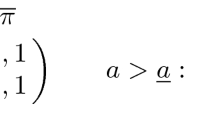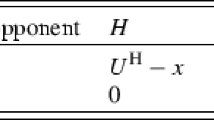Abstract
In this paper a simple and basic signaling game is studied in an experimental environment. First, we check whether we can replicate some of the findings in the literature concerning equilibrium selection and the use and impact of costly signals. Second, and foremost, the comparative statics implications of the game are studied. The experimental results are related to the predictions of two competing behavioral models: a game model, in which subjects are assumed to behave in line with (refined) sequential equilibrium theory, and a decision model, in which subjects are assumed to behave as non-strategic decision makers.
The experimental outcomes replicate the finding in the literature that costly messages are sent more frequently by ‘higher’ sender types (whose information is such that persuasion is also profitable to the responder), and that such messages have an impact on the behavior of the responder. These results are consistent with (versions of) both the game model and the decision model. The comparative statics results, however, clearly point in the direction of the decision model. Play is most strongly affected by ‘own’ payoff parameters, as predicted by the decision model, and less so by opponent's payoff parameters, as predicted by the mixed strategies of the refined sequential equilibrium. Particularly, a decision model in which players are assumed to adapt beliefs about opponents' choice probabilities in response to experience in previous play, appears to succeed best in organizing the data.
Similar content being viewed by others
References
Banks J, Camerer CF, Porter D (1994) An experimental analysis of Nash refinements in signaling games. Games and Economic Behavior 6: 1–31
Brandts, J, Holt CA (1992) An experimental test of equilibrium dominance in signaling games. American Economic Review 82: 1350–1365
Brandts J, Holt CA (1993) Adjustment patterns and equilibrium selection in experimental signaling games. International Journal of Game Theory 22: 279–302
Brandts J, Holt CA (1994) Naive Bayesian learning and adjustment to equilibrium in signaling games. Working paper, Universitat Autonoma de Barcelona
Cadsby CB, Frank M, Maksimovic V (1990) Pooling, separating, and semiseparating equilibria in financial markets: Some experimental evidence. Review of Financial Studies 3: 315–342
Cadsby CB, Frank M, Maksimovic V (1992) Equilibrium dominance in experimental financial markets. Working paper, University of British Columbia
Camerer C, Weigelt K (1988) Experimental tests of a sequential equilibrium reputation model. Econometrica 56: 1–36
Cho I, Kreps D (1987) Signaling games and stable equilibria. Quarterly Journal of Economics 102: 179–221
Cho I, Sobel J (1990) Strategic stability and uniqueness in signaling games. Journal of Economic Theory 50: 381–412
Cooper D, Garvin S, Kagel J (1994) Adaptiv learning vs. equilibrium refinements in an entry limit pricing game. Working paper, University of Pittsburgh
Davis DD, Holt CA (1993) Experimental economics. Princeton University Press, Princeton
Holler MJ, Host V (1990) Maximin vs. Nash equilibrium: Theoretical results and empirical evidence. In: Quand RE, Triska D (eds) Optimal Decisions in Markets and Planned Economies. Boulder Westview Press
Jung YJ, Kagel JH, Levin D (1994) On the existence of predatory pricing: An experimental study of reputation and entry deterrence in the chain-store game. Rand Journal of Economics 25: 72–93
Kagel JH, Roth AE (1992) Theory and misbehavior in first-price auctions: Comment. American Economic Review 82: 1379–1391
McKelvey RD, Palfrey TR (1993) Quantal response equilibria for normal form games. Working paper, California Institute of Technology
Milgrom P, Roberts J (1991) Adaptive and sophisticated learning in normal form games. Games and Economic Behavior 3: 82–100
Mookherjee D, Sopher B (1994) Learning behavior in an experimental matching pennies game. Games and Economic Behavior 7: 62–91
Neral J, Ochs J (1992) The sequential equilibrium theory of reputation building: a further test. Econometrica 60: 1151–1169
Partow Z, Schotter A (1993) Does game theory predict well for the wrong reasons: An experimental investigation. Working paper RR 93-46, New York University
Potters J, van Winden F (1992) Lobbying and asymmetric information. Public Choice 74: 269–292
Tsebelis G (1989) The abuse of probability in political analysis: The Robinson Crusoe fallacy. American Political Science Review 83: 77–91
Wittman D (1985) Counter-intuitive results in game theory. European Journal of Political Economy 1: 77–89
Author information
Authors and Affiliations
Additional information
This is a completely revised version of our paper “An Experimental Study of Lobbying” (August, 1992). Comments by participants in the Amsterdam Workshop on Experimental Economics 1992, in particular Robert Forsythe and Axel Ostmann, by Mark Olson, and by two referees are gratefully acknowledged. Jan Potters is presently affiliated with the University of Tilburg.
Rights and permissions
About this article
Cite this article
Potters, J., van Winden, F. Comparative statics of a signaling game: An experimental study. Int J Game Theory 25, 329–353 (1996). https://doi.org/10.1007/BF02425261
Issue Date:
DOI: https://doi.org/10.1007/BF02425261




